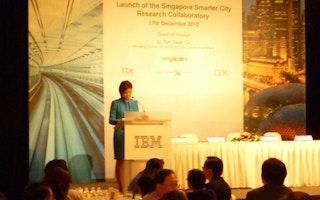IBM Singapore’s managing director Teresa Lim today announced the launch of IBM’s seventh research ‘collaboratory’ at an official signing ceremony with Singapore’s Economic Development Board (EDB) and Land Transport Authority (LTA).
The Smarter Cities Research Collaboratory, called ‘Collab’ for short, will focus on using advanced technology on analytics and optimisation to improve Singapore’s transport, water and energy systems.
Dr Beh Swan Gin, managing director of EDB, announced the initiative as a welcome addition to Singapore’s Living Labs programme. “The IBM Smarter Cities Research Collaboratory will enable IBM to design, develop and test innovative urban technological solutions for global markets. By working with public agencies like LTA, IBM will be able to work on real-life urban problems to help create relevant, workable solutions,” he said.
Launched in 2008 at the World Cities Summit, Singapore’s Living Labs programme fosters cooperation between private enterprises and public agencies aimed at improving urban planning and growth. Singapore’s small size, advanced technological capabilities and proactive policies make it an ideal setting to test-bed urban solutions.
EDB’s assistant managing director, Mr Yeoh Keat Chuan, said that promoting the Living Labs programme has transformed the concept of business-friendly policies here in Singapore, meaning that government agencies now actively seek out public-private tie-ups.
The public-private partnership will bring together the extensive experience and expertise of Singapore’s agencies and universities in a joint effort to provide innovative urban solutions. To this end, IBM is currently in discussions with Nanyang Technological University (NTU) regarding collaboration.
IBM research director Dr Jayant Kalagnanam declined to give specifics regarding the programme’s hiring and investment in Singapore. True to its collaborative nature, the initiative will be shaped according to the strengths and needs of the different partnerships that develop. IBM will likely bring in a number of specialists from overseas on assignment, he said.
One of the reasons for choosing Singapore for the Collab, said Dr Kalagnanam, is that it has in place an extensive sensor network to provide the necessary data. By using and improving existing sensor networks such as LTA’s Expressway Monitoring and Advisory System (EMAS), IBM hopes to help Singapore make the most of its scarce land and natural resources.
First on the Collab’s agenda is transport. Dr Chin Kian-Keong, LTA’s director of Transport & Ticketing Technology, said that Singapore’s limited land availability means that it has to be innovative in solving its traffic issues. For example, systems that react to real-time data on traffic conditions can improve efficiency by diverting traffic around accidents or improving response time for emergency services.
Dr Chin expects alleviating traffic congestion to produce significant cost savings for Singapore. According to IBM data, traffic congestion cost the U.S. economy US$78 billion in 2005, resulting in 4.2 billion lost hours, as well as pollution and wasted fuel. A number of estimates suggest that congestion costs – in developed and developing cities – are between 1 percent and 3 percent of GDP.
Other projects in the works involve energy, particularly optimising smart grids to accommodate electric vehicles and improving energy efficiency in buildings, and improving the efficiency of water treatment and supply.
Solutions developed here will be adapted to help other cities in Asia and around the world. By 2025, Asia will have 16 of the world’s top 25 megacities and over half of the world’s population will live in urban areas. With cities currently consuming 75 percent of the world’s energy and emitting over 80 percent of greenhouse gases, greater efficiency is a must. The lessons learned in Living Labs such as Singapore are crucial to achieving sustainability








